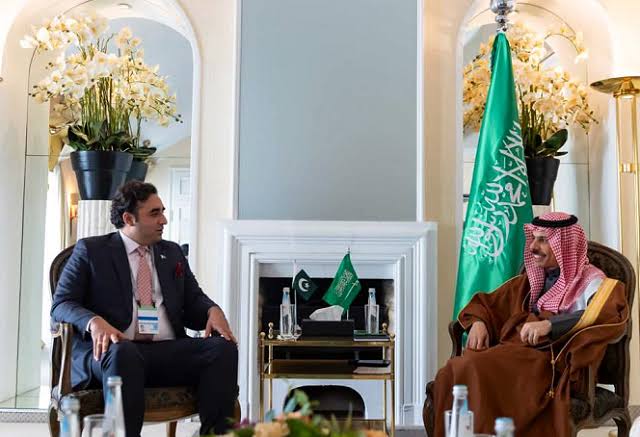Islamabad gets ‘positive signals’ for help from Riyadh, Beijing

Bilawal’s meetings with Saudi, Chinese counterparts during Munich conference went beyond expectations, say sources
Pakistan has received “positive signals” from China and Saudi Arabia for crucial financial support at a time when it is desperately looking towards its old allies in the wake of the current economic crunch.
As the government seeks to revive the International Monetary Fund (IMF) programme, Foreign Minister Bilawal Bhutto Zardari last weekend met his Saudi counterpart and Chinese foreign policy chief on the side-lines of the Munich Security Conference.
Though no details were provided except that Bilawal discussed issues of mutual interests with Saudi Foreign Minister Faisal Bin Farhan Al Saud and Member of the Political Bureau of the CPC Central Committee and Director of the Office of the Central Commission for Foreign Affairs Wang Yi, diplomatic sources told The Express Tribune on Monday that both meetings went beyond expectations of Pakistan.
“What I gathered from the foreign minister’s engagements with his Saudi and Chinese counterparts was that both countries were keen to help Pakistan,” said a source privy to the details. The source hoped that the meetings in Munich would translate into something tangible for Pakistan. “I cannot go into the nitty-gritty but I can tell you that the meetings went really well. Both the Saudi and Chinese foreign ministers were very supportive,” the source claimed.
Pakistan has to secure assurances from Saudi Arabia and China for more loans in order to revive the IMF programme. The government has already taken a series of measures to fulfil the tough IMF conditions. Those include allowing the market determined exchange rate, slapping of new taxes and jacking up electricity and gas tariffs.
But the IMF also needs firm assurances from Pakistan’s friendly countries that they would bridge the gap of external finances. That assurance Saudi Arabia, China and the UAE will have to give directly to the IMF before the Washington-based lender approves the next tranche.
Against this backdrop, Bilawal’s meetings with Saudi and Chinese foreign ministers were significant.
When Ishaq Dar took over as finance minister in September, his first preference was to avoid IMF’s tough conditions by seeking financial assistance from friendly countries.
In November, the finance minister claimed to have secured a $13 billion bailout from China and Saudi Arabia with $5.7 billion fresh loans. Dar was confident that the cash would come before the IMF programme revival.
However, it became clear with time that Pakistan’s old allies refused to dole out more cash without the country first agreeing to the IMF conditions. That was when Pakistan had to invite the IMF mission to negotiate the deal.
Pakistan is now hoping that its friends would come to its rescue as it has done all the hard yards to convince the IMF.
Sources said the meetings in Munich would certainly help the Pakistani cause.
According to Chinese Foreign Minister Wang Yi, Islamabad and Beijing Pakistan were all-weather strategic cooperative partners and China-Pakistan friendship remained rock-solid.
“China is ready to work with Pakistan to well implement the strategic common understandings reached between the leaders of the two countries and build an even closer community with a shared future in the new era,” the statement said.
“China firmly supports Pakistan in maintaining security and stability as well as achieving development and revitalisation, and stands ready to provide assistance within its ability to help Pakistan overcome temporary difficulties,” the statement added.




